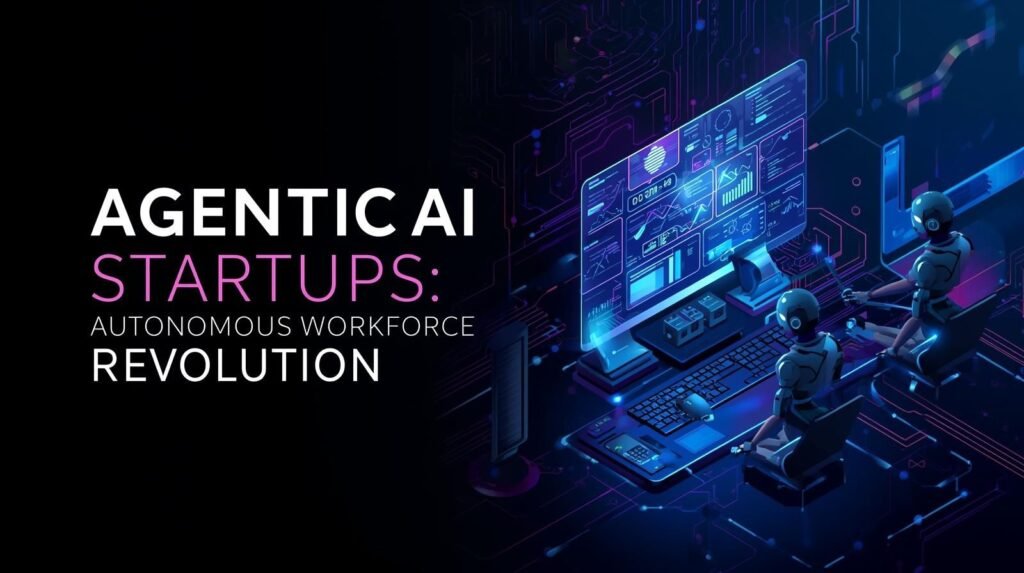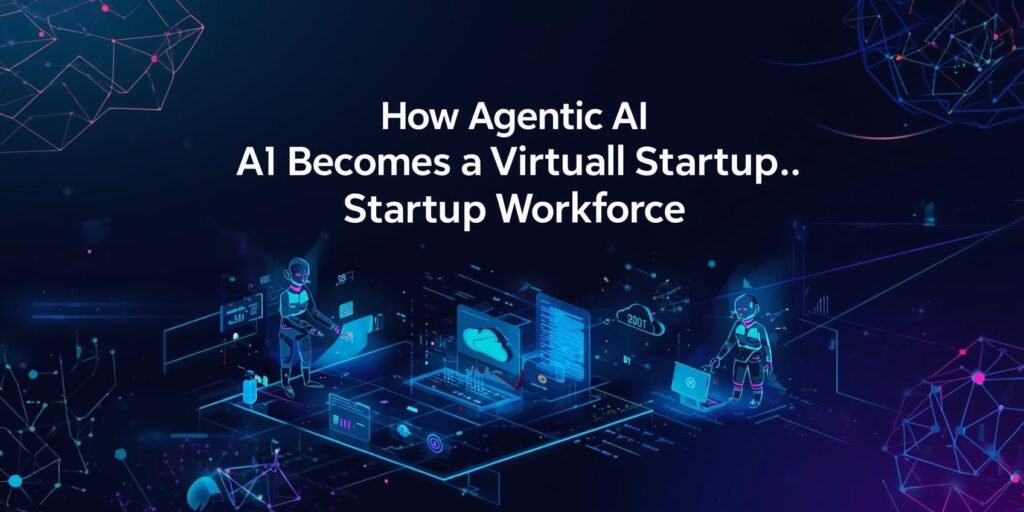
The Rise of Agentic AI in the Startup World
Across global startup hubs — from Silicon Valley to Bangalore — a profound shift is underway as founders begin replacing traditional human teams with autonomous AI agents capable of functioning as virtual employees. This disruption is driven by the limitations of conventional startup models, where hiring rapidly, managing people, and scaling operations create friction, delays, and high burn rates. Agentic AI changes the equation by introducing systems that can analyze data, make decisions, execute tasks, and collaborate across functions without human oversight. Instead of hiring five specialists for marketing, operations, finance, customer support, and analytics, founders can now deploy AI agents that perform these functions simultaneously, continuously, and with precision. The emergence of Agentic AI starrtups-workforces is redefining what it means to build a modern startup — shifting from labor-heavy growth to intelligence-driven scalability that operates 24/7 and evolves with minimal manual intervention.
Why Startups Are Choosing Agentic AI Over Human Teams
Startups operate under extreme constraints: limited capital, tight deadlines, and constant pressure to scale faster than competitors. Traditional hiring introduces complexities — recruitment cycles, training time, salary commitments, performance inconsistencies, and human error. Agentic AI startups offers founders a radically more efficient alternative by serving as a fully autonomous workforce capable of executing specialized tasks with consistency, speed, and adaptability. These AI agents can generate leads, manage CRM systems, run ad campaigns, segment customers, track finances, conduct audits, manage invoices, automate customer support, and even monitor cloud infrastructure. For early-stage founders, this means they can achieve the output of a 10–20 person team at a fraction of the cost, while maintaining operational accuracy and eliminating management overhead. The shift is not just about reducing expenses — it is about unlocking superhuman productivity by replacing slow, manual processes with continuously learning and self-correcting AI-driven workflows.
How Agentic AI Becomes a Virtual Startup Workforce

Agentic AI startups systems are designed to replicate the behavior, reasoning, and responsibilities of human employees — but at a scale and speed no human team can match. These agents operate independently, guided by business goals rather than step-by-step instructions, allowing them to adapt rapidly to new data, market changes, or operational bottlenecks. A marketing agent, for example, can autonomously test campaigns, optimize spend, analyze conversions, and reallocate budgets based on performance metrics. A sales agent can qualify leads, automate follow-ups, update CRMs, draft proposals, and schedule meetings. Meanwhile, an operations agent monitors inventory, predicts demand, coordinates suppliers, and ensures timely order fulfillment. Finance agents reconcile transactions, generate cash flow projections, detect anomalies, and prepare audit-ready reports. Customer support agents manage multi-channel inquiries, classify sentiment, automate resolutions, and escalate only complex issues. Together, this autonomous workforce functions as an interconnected digital organization that learns continuously, communicates internally, and improves decision-making over time.
The Founder Advantage: Lower Burn, Faster Execution, Higher Accuracy
For founders navigating early-stage chaos, the economic and operational advantages of an autonomous AI workforce are profound. Instead of burning capital on large teams, founders can maintain a lean cost structure supported by scalable AI operations. Tasks that previously took hours of human labor — such as processing leads, analyzing customer behavior, generating financial reports, updating inventory, or managing support tickets — now occur instantly and continuously. Execution becomes faster because Agentic AI Startups agents do not require breaks, handovers, or lengthy coordination cycles; they work in real time and adapt to shifting priorities automatically. Accuracy improves significantly because AI agents consistently follow optimized workflows, detect anomalies, and learn from every interaction. For founders, this results in reduced operational drag, sharper business insights, and the ability to iterate product strategies without operational bottlenecks. In short, Agentic AI turns early-stage startups into agile, data-driven powerhouses that operate with the sophistication of enterprise-level organizations.
ASIGyaan and the Evolution of the Self-Operating Startup Model
ASIGyaan is at the forefront of this transformation, offering startups a powerful framework for building self-operating business structures through interconnected intelligent agents. Instead of isolated automation tools, ASIGyaan provides a full-fledged Agentic ecosystem where finance agents coordinate with analytics agents, marketing agents sync with CRM agents, and operations agents collaborate with supply-chain predictors — all through a unified intelligence layer. This multi-agent integration allows startups to streamline every functional department simultaneously while ensuring that decisions are aligned with overall business goals. ASIGyaan’s Agentic AI Startups models also incorporate predictive learning, allowing the system to anticipate revenue fluctuations, customer churn, inventory shortages, and cash flow risks before they occur. For founders, this means the startup becomes a self-optimizing, continuously evolving entity that scales intelligently without requiring constant oversight or management. The result is a new breed of startups built not on human-intensive operations, but on autonomous AI ecosystems capable of achieving rapid, sustainable growth.
The Future: Startups Built on Intelligent, Borderless, Always-On AI Workforces
As Agentic AI Startups technologies mature, the future of startups will be defined by companies that function as intelligent, borderless, always-on systems capable of running themselves. Startups will no longer need to scale headcount to scale operations; instead, they will deploy additional AI agents whenever new capabilities are required. Global expansion will become easier as AI agents operate seamlessly across time zones and languages, enabling 24/7 execution without manual intervention. Founders will focus on vision, innovation, and strategy — while autonomous systems handle the operational backbone with precision and agility. The shift toward AI-driven workforces represents one of the most significant paradigm shifts in modern entrepreneurship, unlocking unparalleled efficiency and reshaping how startups are built and scaled. The founders who adopt Agentic AI early will gain a decisive competitive advantage, building businesses that grow faster, operate smarter, and outperform traditional teams on every metric.

